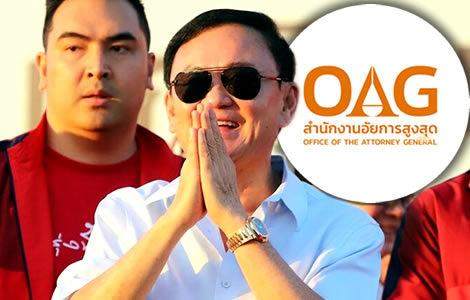The Office of the Attorney-General (OAG) has ruled there is insufficient evidence to prosecute Thaksin Shinawatra and the Pheu Thai Party over claims of attempting to overthrow the government. The decision provides temporary relief as the Constitutional Court prepares to decide on Friday whether to accept or reject the case for consideration.
The Office of the Attorney-General (OAG) on Tuesday confirmed that in its November 8 reply to the Constitutional Court, it explained why it declined to take action against the Pheu Thai Party or former Prime Minister Thaksin Shinawatra. This was based on a citizen activist’s complaint lodged on September 24. The clarification by the Attorney-General’s Office comes just days before the Constitutional Court must decide whether to take up the massive 5,033-page complaint. At the same time, the Election Commission is conducting its own inquiries into the case after opening an investigation in October.

Ahead of a critical Constitutional Court decision on Friday, the Pheu Thai Party scored a significant legal win. Former Prime Minister Thaksin Shinawatra and the ruling party avoided prosecution over claims of attempting to overthrow the government.
The Office of the Attorney-General (OAG) announced it would not pursue action against Mr. Thaksin and the Pheu Thai Party, headed by the ex-PM’s daughter Paetongtarn Shinawatra.
The case stems from a 5,033-page complaint filed on September 24 under Section 49 of the 2017 Constitution. Activist lawyer Mr. Therayut Suwankesorn accused Thaksin and his party of undermining Thailand’s democratic regime.
OAG rules insufficient evidence of attempts to overthrow the state under Section 49 provisions
Specifically, the complaint alleged acts that could overthrow the monarchy-led democratic system.
On October 22, the Constitutional Court ordered the OAG to clarify its response to the claims. By November 8, the Attorney-General’s Office submitted a detailed report to the court.
The report included testimonies and concluded the allegations lacked sufficient evidence to be legally valid. The OAG stated the accusations did not meet the legal threshold to qualify as a coup d’état.
The OAG clarified it had not directly questioned Thaksin. Instead, it examined statements from other parties involved in the case. For instance, Prime Minister’s Office Minister Chusak Sirinil gave evidence to a panel at the OAG.
Afterwards, the agency determined the claims did not show an attempt to overthrow the state. This decision emphasised the high standard of evidence required under Section 49.
Section 49 allows citizens to petition against actions that may harm Thailand’s democratic regime. By law, if the OAG declines to act or fails to respond within 15 days, petitioners can go to the Constitutional Court.
Critics argue this provision encourages politically motivated complaints that destabilise the government.
Election Commission moves in contrast with OAG’s conclusion. Public has confidence in the government
The Election Commission (EC) had earlier accepted the complaint and launched its investigation. EC Secretary-General Sawaeng Boonmee suggested there were grounds to support the claims. The OAG’s findings, however, weaken the petitioner’s case.
The case has added uncertainty to Thailand’s political climate. Nonetheless, Prime Minister Paetongtarn Shinawatra’s administration continues to enjoy public support.
A National Institute of Development Administration (NIDA) poll shows nearly 90% of respondents believe her government will last beyond next year.
As Thailand’s youngest Prime Minister, Paetongtarn remains popular despite mounting political challenges.
Her government, however, faces attacks from opposition parties, especially the Palang Pracharat Party. The party has been in opposition since its ejection from government following the ousting of Srettha Thavisin in August.
Palang Pracharat ramps up opposition efforts, while Pheu Thai gains temporary relief from OAG findings
Former Deputy Prime Minister Prawit Wongsuwan, leader of Palang Pracharat, has stepped up efforts to challenge the government.
The Attorney-General’s decision offers temporary relief for Pheu Thai. Nevertheless, political analysts warn the Constitutional Court could still decide otherwise on Friday.
Thaksin, Pheu Thai six-pronged complaint being reviewed by the Office of the Attorney-General (OAG)
Government firefights political instability as a fissure appears in the cabinet over disputed Buriram land
Pressure mounts again on PM Paetongtarn as the Constitutional Court seeks AG’s input on the complaint
Recent history particularly highlights the unpredictability of Thai politics. Hours before former Prime Minister Srettha’s removal in August, experts predicted his position was secure. The OAG’s report highlighted weakness in the petitioner’s case.
Notably, it emphasised the absence of direct evidence against Thaksin or Pheu Thai. The lack of Thaksin’s testimony, at the same time, limited the investigation’s scope.
The controversy has reignited scrutiny of the 2017 Constitution and its sweeping legal provisions. Critics claim the legal provisions including the Political Parties Act 2017 enable excessive oversight. In particular by agencies like the Election Commission.
Last week, Thaksin criticised these provisions during a speech in Udon Thani. He referred to them as “shitty laws” that hinder effective governance.
Section 160 reform sparked cabinet resistance from coalition partners which delayed constitutional change
Section 160 of the Constitution also continues to draw attention. It imposes strict ethical requirements on government ministers. This section caused tension within the Pheu Thai Party following Srettha’s removal in August.
While there have been calls to amend these provisions, coalition partners have resisted significant constitutional changes. Many argue such reforms could weaken safeguards against unfit appointments.
Efforts to amend the 2017 Constitution face resistance, especially from the Bhumjaithai Party-dominated Senate. For now, constitutional reform appears unlikely before the next general election.
Former Prime Minister Thaksin hinted at this during his recent Udon Thani address. He urged cooperation with the People’s Party, the successor to the dissolved Move Forward Party. The People’s Party has prioritised constitutional reform as its main political issue.
Critics see Thailand’s legal system as a governance minefield created under General Prayut’s rule
Critics argue the current legal framework creates a minefield for governance. Laws drafted during General Prayut’s tenure have fueled political instability and legal entanglements.
The OAG’s decision not to pursue the case provides some relief for the government. However, conservative forces remain arrayed against the administration, using these laws as political weapons.
Meanwhile, Paetongtarn faces separate allegations involving temple aid funds and a golf course owned by her family. These unrelated controversies add to the pressures on her government.
They are creating political instability. In turn, this makes it harder for ministers to focus on governing and addressing Thailand’s chronic problems.
Join the Thai News forum, follow Thai Examiner on Facebook here
Receive all our stories as they come out on Telegram here
Follow Thai Examiner here
Further reading:
Thaksin, Pheu Thai six-pronged complaint being reviewed by the Office of the Attorney-General (OAG)
Ko Kood at the centre of Thailand’s rising political storm waged against Paetongtarn’s government
Pressure mounts again on PM Paetongtarn as the Constitutional Court seeks AG’s input on complaint
Ung Ing papers over the cracks of a cabinet which is already divided after only six weeks in office
Firebrand Jatuporn launches crusade against Thaksin Shinawatra and present government in Bangkok
Political storm brewing as the country’s leading parties struggle to reform the 2017 Constitution


















